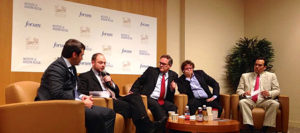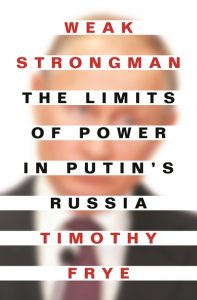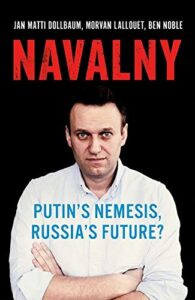Russian police have arrested the leading opposition activist Vladimir Kara-Murza on unknown charges and sentenced him to 15 days in jail after he called the government a “regime of murderers.”
He was arrested outside his home in Moscow, the same day CNN aired an interview in which he predicted that Russia’s invasion of Ukraine would lead to the downfall of President Vladimir Putin’s government, The Washington Post reports:
 Kara-Murza (second from left) is a longtime colleague of the late Russian opposition leader Boris Nemtsov. He is a former candidate for the Russian parliament and served as deputy leader of a political party, the People’s Freedom Party. He played a key role in the adoption of sanctions against Russian human rights violators in the United States, European Union, Canada and Britain.
Kara-Murza (second from left) is a longtime colleague of the late Russian opposition leader Boris Nemtsov. He is a former candidate for the Russian parliament and served as deputy leader of a political party, the People’s Freedom Party. He played a key role in the adoption of sanctions against Russian human rights violators in the United States, European Union, Canada and Britain.
“The authorities are outraged by his courage,” Kara-Murza’s supporter Alexander Podrabinek told video news service Sota.
“The United States is troubled by Russian authorities’ detention today in Moscow of prominent civil society leader Vladimir Kara-Murza,” U.S. Secretary of State Antony Blinken said on Twitter. “We are monitoring this situation closely and urge his immediate release.”
Putin’s brutal war in Ukraine has forever changed millions of lives. Dr. Alina Polyakova tells CNN’s Bianna Golodryga (below) about how CEPA’s Democracy Fellowship Fund will give a critical lifeline to Russia’s independent voices.
Contrary to suggestions that the war in Ukraine could prompt a “a palace coup” to depose Vladimir Putin, Russia’s autocrat is more secure than most people believe, argues former NED Penn Kemble fellow Maria Snegovaya, a postdoctoral fellow at Virginia Tech, an adjunct senior fellow at the Center for a New American Security, and a visiting scholar at George Washington University.
A more likely scenario is the long-term transformation of Russia into something similar to a nuclear Iran, she writes for the Journal of Democracy:
This might look like an internationally isolated regime adept at avoiding the pain of sanctions with a mixed economy and large state-owned sector and acceptance of long-term stagnation. And while the Russian regime lacks an elaborate religious fundamentalist ideology to lend it legitimacy, as Iran has, the Kremlin can, at least in the near term, substitute instead a quasi-ideology of smoldering revanchist anti-Westernism complemented with nuclear threats and occasional military escapades against neighboring states. Much as it has done over the last decade.

Credit: Princeton UP
Russia is a classic personalist autocracy — a single individual, not an organization like the military or a political party, dominates policy and personnel decisions – and overthrowing a personalist autocrat is not easy, argues Columbia University professor Timothy Frye, the author of Weak Strongman: The Limits of Power in Putin’s Russia. Once a ruler is able to create a personalist autocracy by eliminating other centers of power, they are especially hard to dislodge. Research by Milan Svolik at Yale University has shown that the longer personalist autocrats stay in office, the less likely they are to be removed from power by either a coup or an uprising.
There are a couple of factors, though, that should worry Putin, he writes for POLITICO:
- Sanctions and corporate withdrawals will continue to degrade Russia’s economy, punish Russia’s wealthy, and threaten the government’s solvency. …. Over time, the invasion of Ukraine will make it that much more difficult for Putin to balance the dual threats of an elite coup and a mass revolt.
- In addition, wars in autocratic regimes that go badly have brought political change. The Argentine government’s disastrous war over the Falklands/Malvinas is a prime example. Cross-national studies affirm that losing a war increases the risks that an autocratic ruler falls from power.
The idea that there are people who can bring others together, influence Putin or overthrow him is nonsense, analyst Farida Rustamova tells Open Democracy’s Ilya Yablokov. I will believe it if it really happens, but I won’t make predictions. It’s very unlikely.
The news of Kara-Murza’s detention by Russian authorities is “deeply troubling,” Canadian foreign minister Melanie Joly tweeted. “We are monitoring the situation closely. Canada urges for his immediate release.”
 Kara-Murza is best known for falling deathly ill on two separate occasions in Moscow — in 2015 and 2017– with symptoms consistent with poisoning, RFE/RL adds. Tissue samples smuggled out of Russia by his relatives were turned over to the FBI, which investigated his case as one of “intentional poisoning.”
Kara-Murza is best known for falling deathly ill on two separate occasions in Moscow — in 2015 and 2017– with symptoms consistent with poisoning, RFE/RL adds. Tissue samples smuggled out of Russia by his relatives were turned over to the FBI, which investigated his case as one of “intentional poisoning.”
Kara-Murza’s fellow opposition activist Alexei Navalny was also poisoned by FSB hit-men.
A new fly-on-the-wall documentary that unfolds with the pace of a thriller brings together Navalny and investigative journalist Christo Grozev of Bellingcat as they painstakingly assemble the identities of the would-be assassins—and then crack the case wide open, the producers write. NAVALNY offers extraordinary access to a politician who is resolute in his insistence on reform—a leader who will not be cowed by anything, including his own poisoning. SHOWING TONIGHT.
The Russian regime lacks an elaborate ideology to lend it legitimacy, but can substitute a quasi-ideology of revanchist anti-Westernism plus nuclear threats & occasional military escapades, fmr @NEDemocracy Penn Kemble fellow @MSnegovaya @JoDemocracy https://t.co/cXG3x8ZF1P
— Democracy Digest (@demdigest) April 12, 2022







